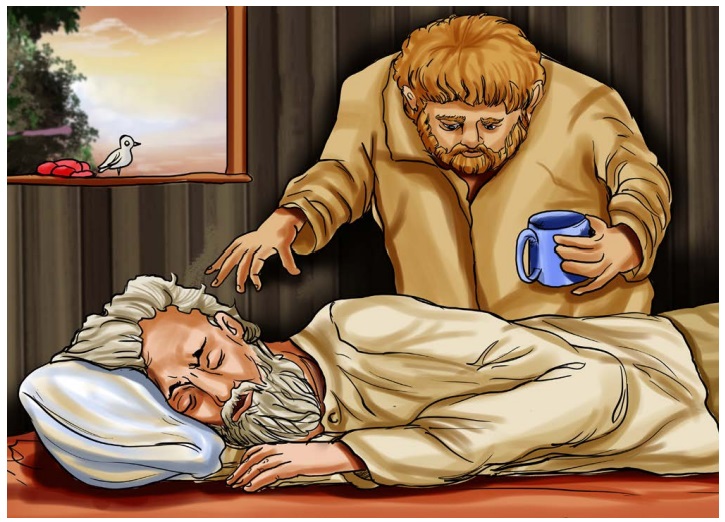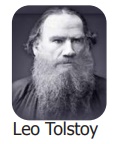Supplementary by Leo Tolstoy - Unit 3 - 8th English - The Three Questions: Section II | 8th English : Unit 3 : Supplementary : The Three Questions
Chapter: 8th English : Unit 3 : Supplementary : The Three Questions
The Three Questions: Section II
The Three
Questions
Leo Tolstoy
Section II
The king turned round and saw a bearded man come running out of the
wood. The man held his hands pressed against his stomach, and blood was flowing
from under them. When he reached the king, he fell fainting on the ground, moaning feebly. The king and the hermit unfastened
the
man’s clothing. There was a large wound in his stomach. The king washed it as best
he could, and bandaged it with his handkerchief and with a towel the hermit had.
But the blood would not stop flowing, and the king again and again removed the bandage
soaked with warm blood, and washed and re-bandaged the wound. When at last the blood
ceased flowing, the man revived and asked for something to
drink. The king brought fresh water and gave it to him. Meanwhile the sun had set,
and it had become cool. So the king, with the hermit’s help, carried the wounded
man into the hut and laid him on the bed. Lying on the bed, the man closed his eyes
and was quiet; but the king was so tired from his walk and from the work he had
done that he crouched down on the threshold, and also fell asleep – so
soundly that he slept all through the short summer night.

When he awoke in the morning, it was long before he could remember
where he was, or who was the strange bearded man lying on the bed and gazing intently
at him with shining eyes.
“Forgive me!” said the bearded man in a weak voice, when he saw that
the king was awake and was looking at him.
“I do not know you, and have nothing to forgive you for,” said the
king.
“You do not know me, but I know you. I am that enemy of yours who
swore to revenge himself on you, because you executed his brother and seized his property. I knew you had gone alone to see the hermit, and I
resolved to kill you on your way back. But the day passed and you did not return.
So I came out from my ambush to find you, and came upon
your bodyguard, and they recognized me, and wounded me. I escaped from them, but
should have bled to death had you not dressed my wound. I wished to kill you, and
you have saved my life. Now, if I live, and if you wish it, I will serve you as
your most faithful slave, and will bid my sons
do the same. Forgive me!”
The king was very glad to have made peace with his enemy so easily,
and to have gained him for a friend, and he not only forgave him, but said he would
send his servants and his own physician to attend him, and promised to restore his
property.
Having taken leave of the wounded man, the king went out into the
porch and looked around for the hermit. Before going away he wished once more to
beg an answer to the questions he had put. The hermit was outside, on his knees,
sowing seeds in the beds that had been dug the day before.
The king approached him and said, “For the last time, I pray you
to answer my questions, wise man.”
“You have already been answered!” said the hermit, still crouching
on his thin legs, and looking up at the king, who stood before him.
“How answered? What do you mean?” asked the king.
“Do you not see?” replied the hermit. “If you had not pitied my weakness
yesterday, and had not dug these beds for me, but had gone your way, that man would
have attacked you, and you would have repented of not having stayed with me. So
the most important time was when you were digging the beds; and I was the most important
man; and to do me good was your most important business. Afterwards, when that man
ran to us, the most important time was when you were attending to him, for if you
had not bound up his wounds he would have died without having made peace with you.
So he was the most important man, and what you did for him was your most important
business. Remember then: there is only one time that is important – now! It is the
most important time because it is the only time when we have any power. The most
necessary person is the one with whom you are, for no man knows whether he will
ever have dealings with anyone else: and the most important affair is to do that
person good, because for that purpose alone was man sent into this life.”
About the
Poet

Leo
Tolstoy (1828 – 1910) was a Russian writer who is regarded as one of the greatest
authors of all time. He is best known for the novels War and Peace (1869) and Anna
Karenina (1877).
Glossary
moaning (v) sob, cry
unfasten (v) - undo, disconnect, untie,
disjoin
revived (v) - restored to life or consciousness
crouched (v) - bent, stopped (down)
threshold (n) - doorstep , entrance
seized (v) - snatched , grabbed, held
of suddenly and forcibly
ambush (n) - surprise attack, trap,
entrap, pounce on
Read and Understand
A. Write ‘True or False’ for the following statement.
1. The bearded
man was an enemy of the king.
2. The king and the hermit refused to help the wounded man.
3. The wounded man asked for the king’s forgiveness.
4. The king promised to restore the property of the bearded man.
B. Match the words in column ‘A’ with their meanings in column ‘B’
A
/ B
1. physician
- bring back
2. restore -
surprise attack
3. repent -
medical practitioner
4. ambush –
regret
[Answer: 1. (c); 2. (a); 3. (d); 4.
(b)]
1. physician - (c)
medical practitioner
2. restore - (a) bring
back
3. repent - (d) regret
4. ambush - (b)
surprise attack
C. Answers
the following questions.
1. Who came running out of
the wood? What happened to him?
Answer: A bearded man came
running out of the wood. Blood was flowing from the wound in his stomach. The
king’s bodyguard attacked him.
2. How did the king and the
hermit restore the life of a wounded man?
Answer: The king and the
hermit unfastened the man’s clothing. The king washed the wound in his stomach
and bandaged it with his handkerchief and with a towel the hermit had. When the
blood stopped flowing, the king gave fresh water for him to drink. Then the
king, with the hermit’s help, carried the wounded man into the hut and laid him
on the bed.
3. Why did the king sleep
through the night?
Answer: The king was so tired
from his walk, from the digging work with the spade and from putting all his
effort to save the bearded man. So he slept soundly through the night.
4. What were the changes in
the behaviour of the wounded man at the end?
Answer: The wounded man was
the enemy of the king. He wanted to kill the king but the king saved his life.
The wounded man asked the king’s forgiveness and wanted to serve the king as a
very faithful slave.
D. Answer the following in 100 words.
1. What were the answers to
the three questions? What is the message of the hermit?
Answer: For the first question
of the king, “What was the right time for every action?”, the answer was, “The
most important time was when the king was digging the beds”. The answer for the
second question, “Who were the most necessary people?” was the hermit was the
most important man.
The final question
was, “What was the most important thing to do?” The answer was to do good for
the hermit was the most important business of the king.
2. Why did the bearded man
ask for the king’s forgiveness? What did the king do to show his forgiveness?
Answer: The bearded man actually came to kill the
king. But when he was badly wounded and bled to death, the king saved his life
by treating his wound. The man whom he wanted to kill, saved his life. This act
of the king made the bearded man feel guilty of his sin.
So the bearded man
asked for the king’s forgiveness. The king was happy to make peace with his
enemy and make his friend. He not only forgave him but also sent his servants
and his own physician to attend on him. The king promised to restore his
property too.
Related Topics